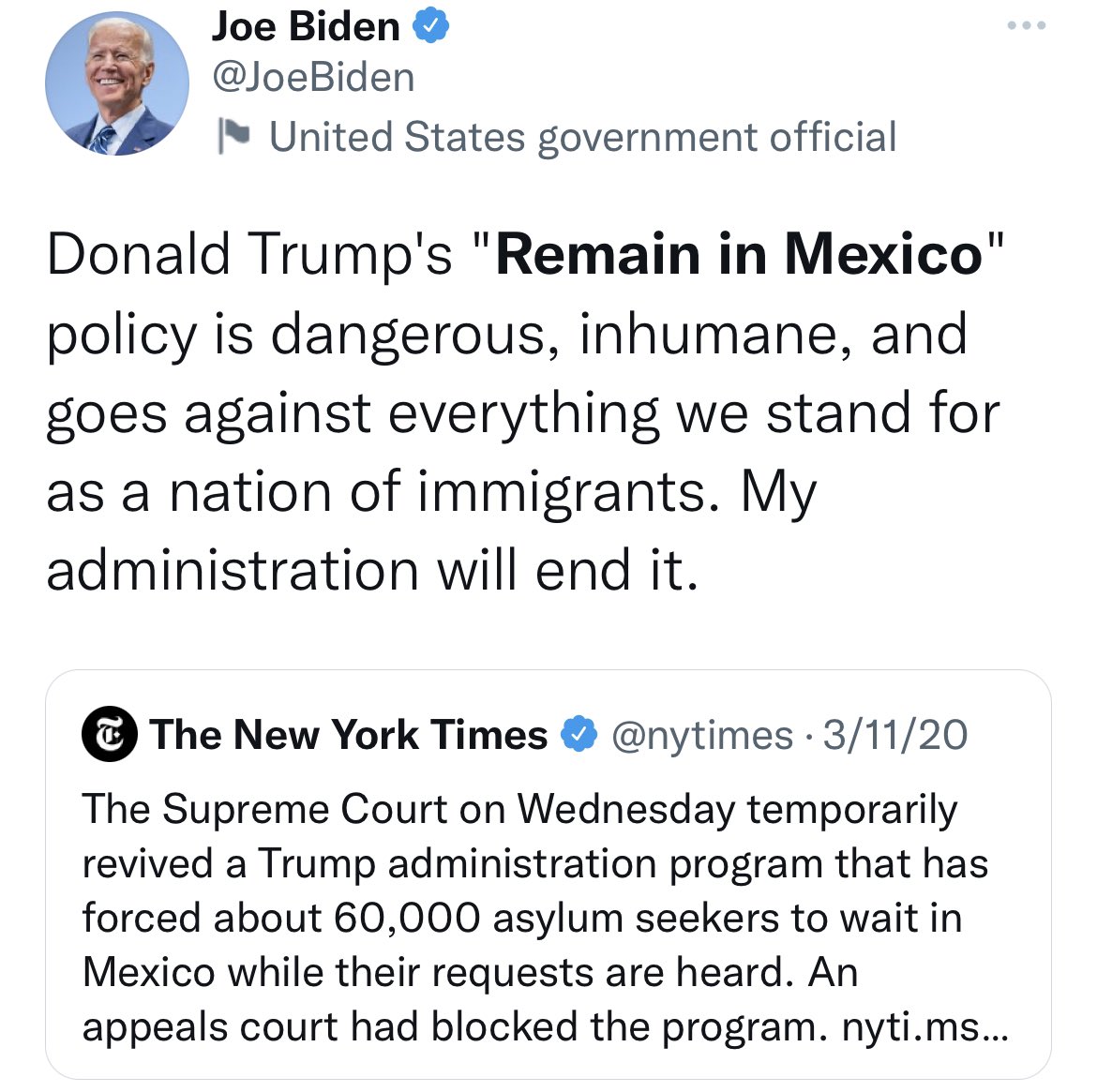You are using an out of date browser. It may not display this or other websites correctly.
You should upgrade or use an alternative browser.
You should upgrade or use an alternative browser.
The Biden Presidency
- Thread starter The Tariff King
- Start date
Jaw
It's OVER 5,000!
I would like to go see your thoughts on the in no way qualified picks of trump
Cause if you believe this about Biden’s picks for agencies
You must have some spicy takes for his opposite of what the agency is meant for etc picks he put in power
Sure. Who do you have in mind? Rex Tillerson was a horrible choice for Secretary of State. Ben Carson didn't know anything about HUD. Pompeo was excellent for both CIA and Secretary of State. Gina Haspel was great for CIA. Perdue was solid for Agriculture. Price was good for HHS. Haley was excellent at the UN, Kelly was fine for Homeland Security, DeVos was laughable for Education. I thought Linda McMahon was a horrible pick for SBA, but she got 81 Senate votes, so nothing to worry about by your standards.
Did you have anyone else in mind?
Jaw
It's OVER 5,000!
I'm looking at some others. Coats was a good choice for DNI, Lighthizer was excellent for Trade. I'm not sure what qualified Chao for Transportation, but she was confirmed with 93 votes. Mnuchin worked for Goldman and Sachs, Soros Fund, and started Dune, Esper was great in Defense, Mattis looked great until he got the job, Sessions sucked, but it's hard to say he was unqualified. Puzder was a bad pick, but Acosta was better.
Jaw
It's OVER 5,000!
Lol the secretary has not been working for two weeks during a major travel crisis... And they didn't even bother informing the public
[tw]1448986199071277069[/tw]
Two months*
sturg33
I
I knew . he was on paternity leave. Knew it since he went on --- paternity leave.
It was out there
Twins, they had twins.
I forget their names
A quick google search doesn't show many any results of his taking paternity leave for two months... do you have any you can share?
Who was manning the fort in the absence?
striker42
Well-known member
Would love to know what statutes "on the books" you are talking about. Anything "on the books" is binding on the states until a court says otherwise (at which point it is not "on the books" or even federal law). "Valid" above meant "not struck down."
No her statement is literally the supremacy clause.
We might be talking across each other here.
Even when a law is struck down it stays "on the books," it's just that the law is not enforceable. If a court in the future decides to reverse that decision, the law becomes enforceable again unless it was repealed in the interim. There are a lot of laws on the books that are unenforceable but which have never been repealed. Go page through the statutes in a lot of states on things like sodomy and abortion. The statutes are still on the books, just unenforceable.
I take "valid" as meaning more than "not struck down." First, there are laws out there that are of questionable constitutionality that the fight has simply not yet happened. More importantly there are two ways to challenge the validity of a law, there's a facial challenge and an as applied challenge. A facial challenge is that the law is unconstitutional as a whole. Congress passed a law saying that you couldn't have a gun in a school zone trying to say they could under the Commerce Clause. The SCOTUS determined that was too far and that it was straying into the realm of general police powers that belong to the States.
The as applied challenge is trickier. There are times where a statute is fine on its face but there are ways in which it is used that are unconstitutional. Suppose there's a jay walking law that states that it's against the law to step into a street except at a cross walk. That law is fine on its face. Now suppose someone wants to hold a march to advocate a political issue and they're told they can't because of the jay walking law. That statute is facially valid but as applied it might be an unreasonable restriction on speech. So laws can be valid in most instances but be used in an invalid way.
Then you get into actions of executive agencies. A valid rule passed by an administrative agency under authority delegated to them by Congress can trump state law but those rules can be dicey. We've seen with the CDC eviction ban that there are limits to what agencies can do under their mandates.
So simply saying in a blanket statement that Federal Law overrides state law is not correct. There are lots of times where Federal Law has been prevented from overriding State Law because Congress or an executive agency lacked the power to do it.
Metaphysicist
Not Actually Brian Hunter
Oh I see so osha can now do whatever it wants. It can reinstitute slavery if they so choose.
I look forward to voting osha out at next election
Not how either delegation or rule-making works, so don’t worry. You are free to vote for Congresspeople who will vote to repeal the delegation. Until then, OSHA regulations get to be federal law. Happy to help with other questions.
Metaphysicist
Not Actually Brian Hunter
We might be talking across each other here.
Even when a law is struck down it stays "on the books," it's just that the law is not enforceable. If a court in the future decides to reverse that decision, the law becomes enforceable again unless it was repealed in the interim. There are a lot of laws on the books that are unenforceable but which have never been repealed. Go page through the statutes in a lot of states on things like sodomy and abortion. The statutes are still on the books, just unenforceable.
I take "valid" as meaning more than "not struck down." First, there are laws out there that are of questionable constitutionality that the fight has simply not yet happened. More importantly there are two ways to challenge the validity of a law, there's a facial challenge and an as applied challenge. A facial challenge is that the law is unconstitutional as a whole. Congress passed a law saying that you couldn't have a gun in a school zone trying to say they could under the Commerce Clause. The SCOTUS determined that was too far and that it was straying into the realm of general police powers that belong to the States.
The as applied challenge is trickier. There are times where a statute is fine on its face but there are ways in which it is used that are unconstitutional. Suppose there's a jay walking law that states that it's against the law to step into a street except at a cross walk. That law is fine on its face. Now suppose someone wants to hold a march to advocate a political issue and they're told they can't because of the jay walking law. That statute is facially valid but as applied it might be an unreasonable restriction on speech. So laws can be valid in most instances but be used in an invalid way.
Then you get into actions of executive agencies. A valid rule passed by an administrative agency under authority delegated to them by Congress can trump state law but those rules can be dicey. We've seen with the CDC eviction ban that there are limits to what agencies can do under their mandates.
So simply saying in a blanket statement that Federal Law overrides state law is not correct. There are lots of times where Federal Law has been prevented from overriding State Law because Congress or an executive agency lacked the power to do it.
Striker, you are just using words in ways that no one actually uses them to call a completely boring statement of 5th grade civics wrong. The Supremacy Clause says “the Laws of the United States [i.e. federal law] … shall be the Supreme Law of the Land; and the Judges in every State shall be bound thereby, any thing in the Constitution or Laws of any State to the Contrary not withstanding.” It is painfully straightforward: Federal Law beats state law where they conflict. Thats all she said. She didn’t say “federal law is infinite in scope and we can therefore make anybody do anything.” Her statement is boring and uncontroversial.
Your “struck down laws are still federal law so actually this is very complicated” premise is plainly wrong because if they were still “law” they would still be binding on the state courts under the Supremacy Clause. But obviously thats not the case. Reductio ad absurdum. This is Marbury judicial review means “saying what the law is” stuff. Striking it down means it is not law. But until a court says otherwise, its the law. This is the status of “questionable” laws. They are supreme until a court says they are not law.
You are also conflating the limits of federal law with authority of federal law, but she didn’t say “federal law can be about anything.” Yes, the scope of federal law is limited and it doesn’t reach certain subject matter. That doesn’t mean state law “wins” there. It means there is no federal law so the state is the highest authority. After Lopez struck down the gun free school zone law, no one said “welp federal law still says this but i guess we have to let state law trump,” they said “federal law doesn’t reach this issue, so this is not federal law.” There are no federal laws beyond the scope of federal laws. Again, it is an absurdity.
Yes, some states pass unenforceable abortion laws or whatever because they are waiting for a change in the law. Those laws are unenforceable because … drumroll… Federal Law beats state law.
There are NO times where “Federal Law has been prevented from overriding State Law because Congress or an executive agency lacked the power to do it.” In the scenarios you are talking about a Court finds that an action/statute is unconstitutional and is therefore NOT FEDERAL LAW. They absolutely do not say “huh, yeah, this is still a federal law but state law wins here.”
It is very annoying that you who went to law school are giving cover for this very dumb thing sturg said.
Metaphysicist
Not Actually Brian Hunter
oh thanks. what limits does OSHA have on rule making?
The limits set by Congress in the OSH Act and the APA.
They never look for the best person for the job. They look at who who scores highest on the intersectionality chart and go from there. Bonus points for working on the sham of climatizing the armed forces. So much virtue. So much signalling.
Donald Trump put people in charge of agencies and into cabinet positions with little to no experience in those fields as well. He just signaled different virtues.
Lol the secretary has not been working for two weeks during a major travel crisis... And they didn't even bother informing the public
[tw]1448986199071277069[/tw]
Something tells me there are members of the Transportation department that handle these day-to-day issues. Pretty sure they weren’t just waiting for Buttigieg to handle the situation.


